
Monkey Island is a series of adventure games. The first four games were produced and published by LucasArts, earlier known as Lucasfilm Games. The fifth was developed by Telltale Games with LucasArts, while the sixth was developed by Terrible Toybox with Lucasfilm Games and Devolver Digital.

Loom is a 1990 fantasy-themed graphic adventure game by Lucasfilm Games. The project was led by Brian Moriarty, a former Infocom employee and author of classic text adventures Wishbringer (1985), Trinity (1986), and Beyond Zork (1987). It was the fourth game to use the SCUMM adventure game engine, and the first of those to avoid the verb–object interface introduced in Maniac Mansion.
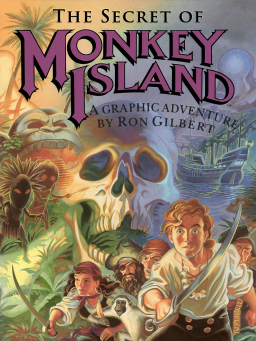
The Secret of Monkey Island is a 1990 point-and-click graphic adventure game developed and published by Lucasfilm Games. It takes place in a fictional version of the Caribbean during the age of piracy. The player assumes the role of Guybrush Threepwood, a young man who dreams of becoming a pirate, and explores fictional islands while solving puzzles.
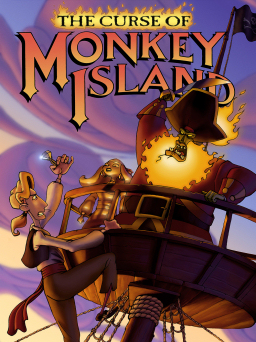
The Curse of Monkey Island is an adventure game developed and published by LucasArts in 1997. A sequel to 1991's Monkey Island 2: LeChuck's Revenge, it is the third game in the Monkey Island series.

Monkey Island 2: LeChuck's Revenge is an adventure game developed and published by LucasArts in 1991. A sequel to 1990's The Secret of Monkey Island, it is the second game in the Monkey Island series. It was the sixth LucasArts game to use the SCUMM engine, and the first game to use the iMUSE sound system. In it, pirate Guybrush Threepwood searches for the legendary treasure of Big Whoop and again faces off against the pirate LeChuck, who is now an undead corpse.

Deluxe Paint, often referred to as DPaint, is a bitmap graphics editor created by Dan Silva for Electronic Arts and published for the then-new Amiga 1000 in November 1985. A series of updated versions followed, some of which were ported to other platforms. An MS-DOS release with support for the 256 color VGA standard became popular for creating pixel graphics in video games in the 1990s.
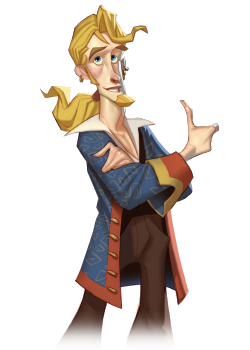
Guybrush Ulysses Threepwood is a fictional character who serves as the main protagonist of the Monkey Island series of computer adventure games by LucasArts. He is a pirate who adventures throughout the Caribbean in search of fame and treasure alongside his love interest and later wife, Elaine Marley, often thwarting the plans of the undead pirate LeChuck in the process. Though a "mighty pirate" by his own account, he is a rather clumsy and disorganized protagonist throughout the series. It is a running joke throughout the games for characters to garble Guybrush Threepwood's unusual name, either deliberately or accidentally. In all voiced appearances, Guybrush has been portrayed by actor Dominic Armato.

Escape from Monkey Island is an adventure game developed and released by LucasArts in 2000. It is the fourth game in the Monkey Island series, and the sequel to the 1997 videogame The Curse of Monkey Island. It is the first game in the series to use 3D graphics and the second game to use the GrimE engine, which was upgraded from its first use in Grim Fandango.

From the late 1980s to the early 2000s, LucasArts was well known for their point-and-click graphic adventure games, nearly all of which received high scoring reviews at the time of their release. Their style tended towards the humorous, often irreverent or slapstick humor, with the exceptions of Loom and The Dig. Their game design philosophy was that the player should never die or reach a complete dead-end, although there were exceptions.

Ron Gilbert is an American video-game designer, programmer, and producer. His games are generally focused on interactive story-telling, and he is arguably best known for his work on several LucasArts adventure games, including Maniac Mansion and the first two Monkey Island games. In 2009, he was chosen by IGN as one of the top 100 game creators of all time.
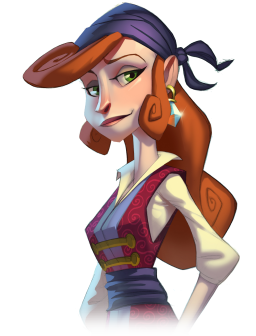
Elaine Marley is a character in the Monkey Island series of graphic adventure video games. Created by Ron Gilbert for LucasArts, the character first appears in The Secret of Monkey Island and is one of the core characters in the franchise. Originally conceived as a ruthless island governor, the character evolved during development into the protagonist's love interest. While the first two games in the series did not feature voice acting, Elaine was voiced by Alexandra Boyd in The Curse of Monkey Island and by Charity James in Escape from Monkey Island; Boyd would reprise the role for later entries in the franchise.
iMUSE is an interactive music system used in a number of LucasArts video games. The idea behind iMUSE is to synchronize music with the visual action in a video game so that the audio continuously matches the on-screen events and transitions from one musical theme to another are done seamlessly. iMUSE was developed in the early 1990s by composers Michael Land and Peter McConnell while working at LucasArts. The iMUSE system was patented by LucasArts in 1994, after being added to the fifth version of the SCUMM game engine in 1991.
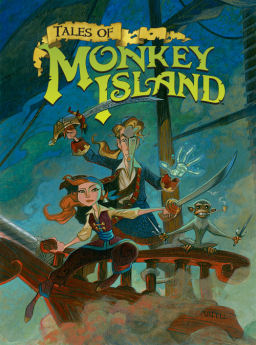
Tales of Monkey Island is a 2009 graphic adventure video game developed by Telltale Games under license from LucasArts. It is the fifth game in the Monkey Island series, released nearly a decade after the previous installment, Escape from Monkey Island. Developed for Windows and the Wii console, the game was released in five episodic segments, between July and December 2009. In contrast to Telltale's previous episodic adventure games, whose chapters told discrete stories, each chapter of Tales of Monkey Island is part of an ongoing narrative. The game was digitally distributed through WiiWare and Telltale's own website, and later through Steam and Amazon.com. Ports for OS X, the PlayStation Network, and iOS were released several months after the series ended.

Kung Fu Panda 2 is a 2011 American animated martial arts comedy film produced by DreamWorks Animation and distributed by Paramount Pictures. Directed by Jennifer Yuh Nelson and written by the writing team of Jonathan Aibel and Glenn Berger, the film is the sequel to Kung Fu Panda (2008), and the second installment in the Kung Fu Panda franchise. It stars Jack Black, Angelina Jolie, Dustin Hoffman, Seth Rogen, Lucy Liu, David Cross, James Hong and Jackie Chan reprising their roles from the first film, with Gary Oldman, Michelle Yeoh, Danny McBride, Dennis Haysbert, Jean-Claude Van Damme and Victor Garber voicing new characters. In the film, Po and his Furious Five allies travel to Gongmen City to stop the evil peacock Lord Shen from conquering China, while also rediscovering Po's forgotten past.

Poker Night at the Inventory is a poker video game developed by Telltale Games. It features four characters from different franchises: Tycho Brahe from the Penny Arcade webcomic, Max from the Sam & Max franchise, the RED Heavy Weapons Guy from Team Fortress 2, and Strong Bad from the Homestar Runner web series. The game was released on November 22, 2010. A sequel, Poker Night 2, was released in 2013. The game was delisted from Steam on May 23rd, 2019.
King's Quest III: To Heir is Human is a VGA-style fangame remake/reimagining/retelling of Sierra Entertainment's King's Quest III: To Heir Is Human by Infamous Adventures. It was released on June 19, 2006. A slightly expanded remake offers new material including; new cutscenes, a few new characters, expanded narration or dialogue, additions and changes to some of the plot, full speech, new or modified locations, and Easter eggs. Most of the original puzzles remain intact or item placement changed. The game received the AGS reward for best documentation in 2006.

The International House of Mojo is a website focused on LucasArts video games. It later expanded to cover studios founded by former LucasArts employees, including Double Fine Productions, Telltale Games, Autumn Moon Entertainment and Crackpot Entertainment. It was founded in 1997 by James Spafford and is among the longest-running "fan sites" on the internet.

Tajemství Oslího ostrova, known in English as The Secret of Donkey Island, is a 1994 Czech point-and-click adventure video game. Distributed by Petr Vochozka through his company Vochozka Trading in June 1994, it was the first nationally distributed PC game in the country and one of the first Czech games commercially available. A parody of the successful Monkey Island series, the story plays out as if it were a direct sequel to The Secret of Monkey Island, ignoring the continuity of Monkey Island 2: LeChuck's Revenge.
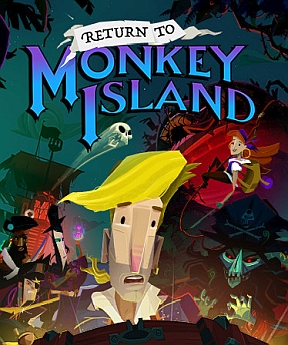
Return to Monkey Island is a point-and-click adventure game developed by Terrible Toybox and published by Devolver Digital. The sixth Monkey Island game, it was released for macOS, Nintendo Switch, and Windows on September 19, 2022, for Linux on October 26, 2022, for PlayStation 5 and Xbox Series X/S on November 8, 2022, and for iOS and Android on July 27, 2023. It was the first Monkey Island game by the series' creator, Ron Gilbert, since Monkey Island 2: LeChuck's Revenge (1991).
Charleen Badman is an American chef and co-owner of the FnB restaurant in Scottsdale, Arizona, who won the 2019 Best Chef in the Southwest James Beard Award. It was the first time since 2007 that a chef from Arizona won the award.
















